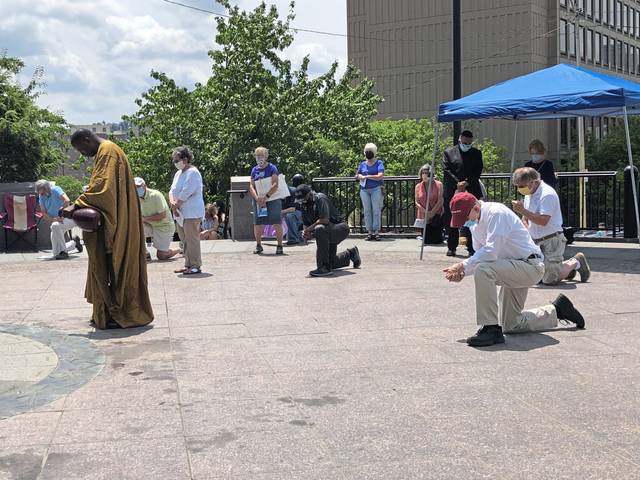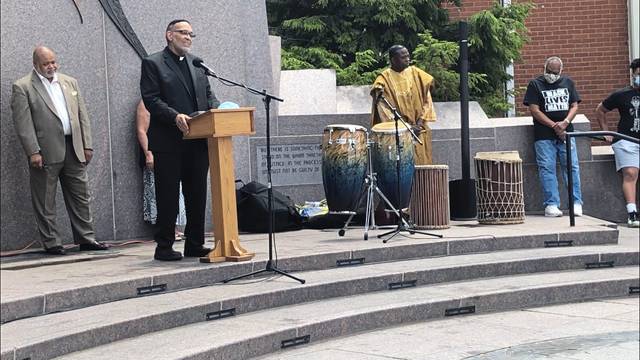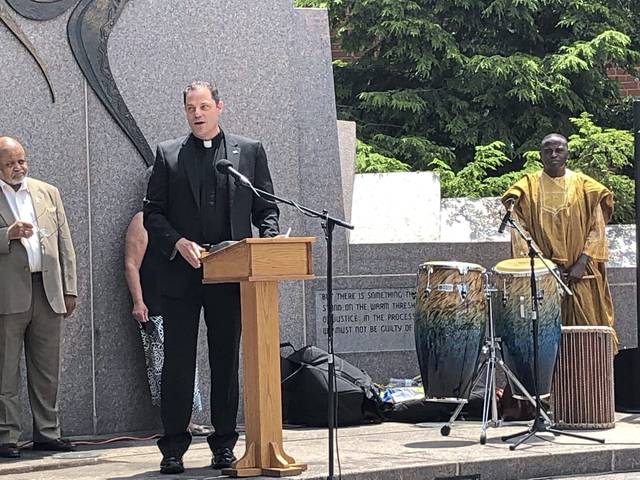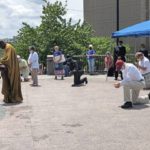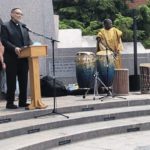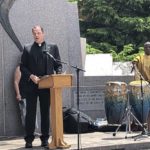The priests of St. Benedict the Moor Church in the Hill District hosted a prayer vigil Sunday, in solidarity with the Black Lives Matter movement.
The church was recently designated a “personal parish” to serve the Black community, and priests were assigned to the newly-formed parish only the day before.
“We have a lot of work to do,” said the Rev. Thomas Burke, who was named pastor. “But know that I am here with you and for you.”
Heat radiated off the pavement at Freedom Corner, and the sound of bongo drums filled the air. Starting at 1 p.m., dozens of community members, wearing masks, gathered at the corner as clergy from across the Diocese of Pittsburgh shared testimony and scripture. Many wore T-shirts with the phrase “Black Catholics Matter.”
Between each message, the crowd was led in songs like “Amazing Grace,” “This Little Light of Mine” and “Lift Every Voice and Sing,” regarded as the Black national anthem.
The vigil also included eight minutes and 46 seconds of silence, while names of Black men and women killed by police were read over a speaker. Several attendees knelt on one knee while a libation – a ritual pouring of water – was performed around Freedom Corner.
Many of the afternoon’s speakers gave messages of hope and comfort, as well as a call to action.
The Rev. John Segun Odeyemi, who is Nigerian by nationality and now serves at St. Paul Cathedral in North Oakland, listed examples of racial injustice over centuries — slavery, Jim Crow laws, mass incarceration. He encouraged people to continue protesting and demanding change.
“We will not lose any more brothers and sisters,” he said.
The Rev. Augustine Wayii, resident priest at the Divine Mercy parish grouping that serves Downtown Pittsburgh, encouraged Black individuals to remember their worth in the eyes of God, who created all people equally, he said.
“You are not a mistake. You are not a second-class citizen,” he said. “You are not inferior.”
Richard Stewart, a parishioner at St. Benedict the Moor and president of the NAACP Pittsburgh chapter, emceed the event. He said he prays every day that racial injustice in the U.S. will “cease and desist,” and he encouraged attendees to do the same.
After the event, he reflected on his life growing up at St. Benedict the Moor and serving as an altar boy. He said it’s crucial the Catholic Church be involved in the Black Lives Matter movement to show support and oppose blatant injustice.
“It’s about humanity,” he said. “It’s about the snuffing out of lives that shouldn’t be taken. And there’s been so many in the last 10 years.”
Many of the clergy echoed the sentiment that the event was an important gesture for the Catholic Church and the new personal parish – designed to address specific spiritual needs, often related to a particular culture. In this case, the parish serves the Black Catholics in the Hill District.
“It means that Black lives do matter and we’re able to celebrate within the spirituality of our church,” said the Rev. David Taylor, another priest assigned to St. Benedict the Moor on Saturday.
The Rev. Matt Hawkins was also assigned to St. Benedict the Moor — and ordained as a priest by Bishop David Zubik on Saturday. The vigil was Hawkins’ first event as a priest with his newly-assigned parish. He spent his time at the microphone explaining the message behind the Black Lives Matter movement, and the necessity of preserving the African American experience and culture with respect that equals that given to other cultures.
“To say Black Lives Matter is to say all lives matter, including the lives of Black Americans that have been treated historically and even today as being expendable, disposable and of little value,” he said.
Later, he said it was the duty of the church to advocate for social justice issues, to be “consistent” with its beliefs, Hawkins said.
“I think in the world today, we have too many people living in isolation from anyone or any culture that is unfamiliar to them, and therefore they fear what they don’t know,” he said. “Well, as Catholics, we have a responsibility to overcome those fears and reach out to one another.”


